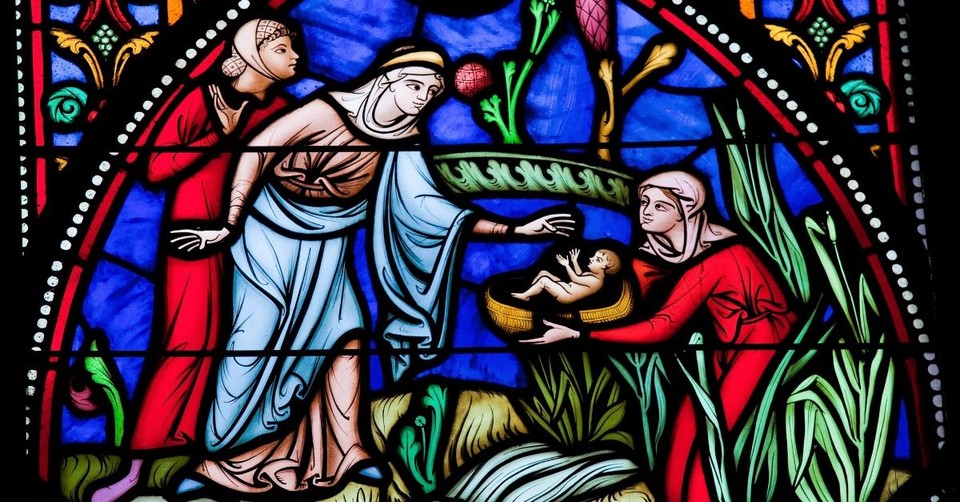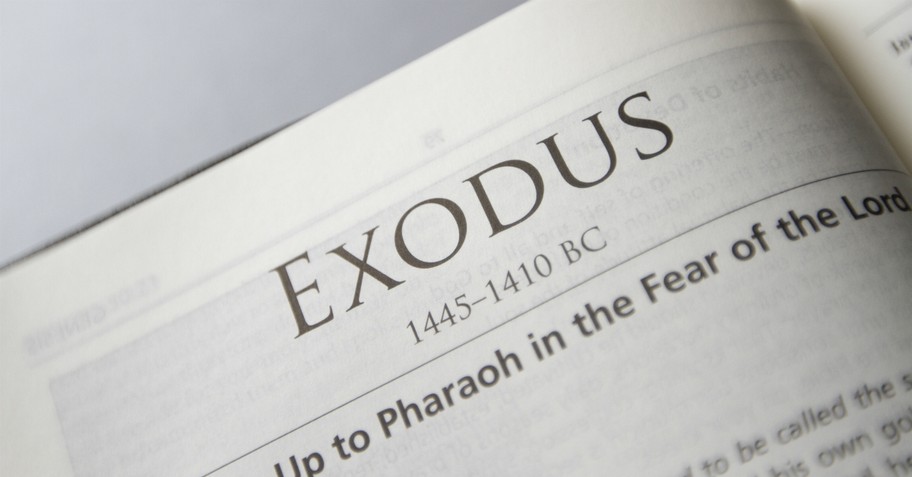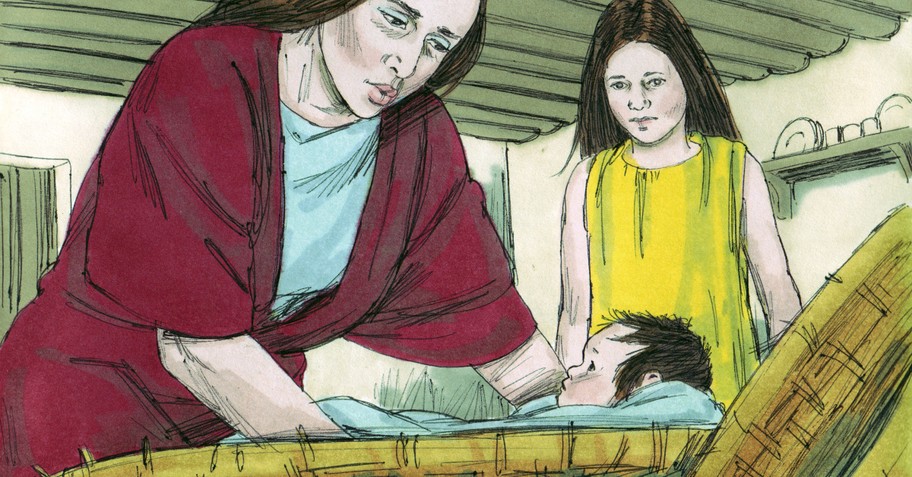4 Lessons We Can Learn from God's Protection of Baby Moses

Can you imagine being a pregnant Hebrew living in Egypt during the time of Moses? Not only did the Egyptians “ruthlessly [make] the people of Israel work as slaves and made their lives bitter with hard service," but also we read in the first chapter of Exodus that they enacted a policy that ensures the death of every male Hebrew child.
In the ancient world, having a son brought not only joy but also the promise of security and stability for a family. But that hope would now be dashed. Pregnancy became a time of fear instead of joyous hope. The Hebrew people were in a dire situation--a situation that seems completely contrary to the promises that God made to them in Genesis 12:1-3. Yet this is a story of hope. In this story, we see the seeds of hope that would be fully realized in Jesus Christ and will be actualized in the new heaven and the new earth. I see 4 things in the story of God’s protection of baby Moses that can help us today.
In Exodus 2 we hear of a young couple who decides to hide their child instead of letting him be thrown into the river to drown. The baby's mother places him in a basket and sends it downriver. The child floats down the river a bit and then, by the providence of God, the daughter of Pharaoh spots the basket. She has her servant check it out and discovers that a child is being hidden inside. She has pity upon the crying child and rescues him. But she is not able to nurse this child and so they call upon a Hebrew woman to nurse him. By God’s grace, the baby's own mother is the one selected to nurse this baby who would be adopted into this powerful Egyptian family. This baby we find out is none other than Moses—the one who would become the rescuer of the Israelites.
Photo Credit: ©GettyImages/Jorisvo
What is the Story of Baby Moses?
At the end of Genesis, the Israelites are safely in Egypt during a great famine. Joseph, an Israelite, rose through the ranks of Egypt. But as the pages of Exodus unfold we find that a new king arose who did not know about Joseph’s great work and wisdom in rescuing the Egyptians from this famine. In fact, this particular king was afraid of the prosperous Hebrews/Israelites. As one commentator said, “the Israelites were now foreigners in a country whose government hated foreigners”. This means that the more they were “fruitful and multiplying” the more the Egyptians hated them. This king has another nation living within its own nation. They had seen these things lead to revolt before and so he enacts a policy to stamp out this threat. They murder Hebrew children.
Thankfully, “the Hebrew midwives feared God and did not do as the king of Egypt commanded them, but let the male children live.” This only infuriated the pharaoh who escalated his policy and put it in the hands of all the people: “Every son that is born to the Hebrews you shall cast into the Nile, but you shall let every daughter live.” And just to be clear, he’s not being kind to the females—he’s keeping them around to use them at a later date.

4 Things We Can Learn from God's Protection of Baby Moses
There is much that can be learned from this story. Within the narrative itself, we should read this story of great anticipation of God’s rescue. A principle of drama is that you don’t put a gun on a stage unless you intend to use it. Likewise, you don’t have a Hebrew baby rescued out of a basket for no good purpose. We see in God’s protection of baby Moses far more than just the rescue of Moses. It’s a picture of our own rescue. There are four things we can learn here from God’s protection of baby Moses.
1. There is Real Evil in the World, and it Has Painful Consequences.
From the perspective of the Egyptians, I suppose the Israelites would have been the evil enemies. This was how the pharaoh would have framed the situation. As one commentator notes, “plays on the universal xenophobic tendency of peoples to fear losing their jobs, their wealth, their land, and their political control to foreigners in their midst.” Xenophobic simply means fear of other nations—fear of those who don’t look like us, talk like us, and think like us. And so what the pharaoh does is enact a dynasty-wide policy of slavery and oppression against this people group. In case it needs to be stated, this is an evil way of thinking about other image-bearers.
The bitter slavery which they placed upon the backs of the Israelites would have separated them from their families for months at a time. And when that didn’t work they began killing their children. These policies are evidence of the evil which humans can perpetuate upon one another, and the evil systems that they can create. I think Mike Wilkerson says it well, “Egypt was a place of pain from cradle to the grave. They plodded through an exhausting life that ended in an unnoticed death, just one more nameless body spent and discarded.” Then he brings into our time by saying, “You too may have been born into an unsafe or dysfunctional home, or trained to believe lies from an early age.”
Are we the Israelites or the Egyptians in this story? Either way, there is real evil in this world but thankfully God is redeeming it.
Photo Credit: ©Sparrowstock
2. God is Still Working Even When it Seems Like a Situation is Hopeless.
The Egyptians wanted to annihilate the Israelite people. God had already purposed to redeem humanity through One who would be born of the Israelites. Whose purpose do you think will stand? The story of Exodus is about the powerful hand of God in redeeming His people. We see this as well in the story of baby Moses being protected.
A cradle is meant to protect a newborn baby. It’s not exactly created to be a boat (or an ark). But this is what the Bible calls this basket. I appreciate how Ryken says this, “At one moment in history, God’s entire plan for triumphing over evil was riding down the Nile River in a little papyrus basket.”
The hand of God behind the rescue of Moses is unmistakable. The timing for the basket to arrive at just the exact moment it needed to for this young Egyptian girl to discover it. The right person discovered the baby at the exact right time and then was given to the boy's very own mother to nurse. These things are not a coincidence. God was clearly working to save this child and place him into an instrumental position within Egypt. Why? Because God had purposed to rescue the Israelites. And he purposed to rescue the Israelites because he had purposed to rescue humanity through Jesus Christ. We can know then, for certain, that God is going to accomplish His purpose of redeeming all those who trust in Christ. This is a certainty. And even though there might be times when hope is hanging by a thread, God is still powerfully working.

3. God Uses Ordinary Means/People to Accomplish His Purposes.
Certainly, God is the mover in the story of the Exodus. There are many times in which God, and only God, was the one acting to provide their rescue. As the story unfolds it is clearly God, and God alone, who is able to part the sea. But it’s also true that the Israelites had to walk through the sea. Likewise, God is clearly working in preserving a baby in a basket floating down the Nile. But there are other players in the story—ordinary and nameless people who were used to accomplish God’s purpose.
One of the heroes in this narrative is the Hebrew midwives. They did not directly impact Moses’ story. It was because of their obedience and fear of the LORD that the evil pharaoh escalated his godless and murderous plan. But it was through their obedience that God saved many Israelite children. We still do not know their names but they are heroes.
In the same way today, God is going to accomplish His purpose in history. But he calls upon us ordinary people to do ordinary acts of obedience to fulfill His purposes. God’s rescue required the faith of his mother to entrust this baby to the Lord’s protection. It required the kindness of the pharaoh’s daughter. It required Miriam’s obedience as well as her wisdom. And it would once again require Moses’ mothers’ willingness to let her baby go for his own good.
4. God’s Rescue of Moses Points to a Greater Rescue.
As the story of the Exodus unfolds it is clear that Moses is a rescuer but he is not the Rescuer. He is not the one of whom it was said would “crush the head of the serpent”. God’s rescue of Moses meant that the people of God were left to fight another day. But there would still be many other battles that had to be fought. There would still be a wilderness, a generation of judges and kings, a myriad of prophets, and failure upon failure of the people to keep God’s covenant. There would be golden calves, adulterous kings, murderous villains, false prophets, and an exile. But this rescue of Moses would be a precursor to another child which would be born and it would be “out of Egypt” that God would call His Son. The rescue of Moses led to the birth of Jesus which led to the rescue of humanity. God’s work in this rescue points to the Greater Rescue.
Photo Credit: ©Getty Images/BibleArtLibrary
The Same God Who Protected Baby Moses Still Protects Those Who Follow Him.
Let’s look at this story honestly, though. There were some families who did not get to see their baby saved and then raised by the Egyptians. There were some generations that lived every day of their life in bitter slavery. The same is true today. Stories of God’s protection do not necessarily mean that you will have temporal protection today. These stories point to something much greater in which we place our ultimate hope. Sometimes we aren’t “protected” at least from the perspective of this life.
So how can we still have hope? If we cannot be certain that God’s protection for Moses is a promise that we ourselves will always be safe and protected, how can we know that we can trust God? Because ultimately our hope rests not in temporary rescue but in the forever rescue that Jesus secured on our behalf. Little stories of rescue—like that of Moses—point to the much bigger protection that we have.
God is able to protect you in the here and now. If it is God’s purpose you can be in a situation just as perilous as the Hebrew people whose only hope was in a little baby floating in a basket down the Nile. If God aims to protect you at that moment, you will be protected. But if God has a different purpose for the present we still hope in that day in which all pain and sorrow will be gone and we will be firmly and finally protected for all eternity.
Originally published October 26, 2021.








